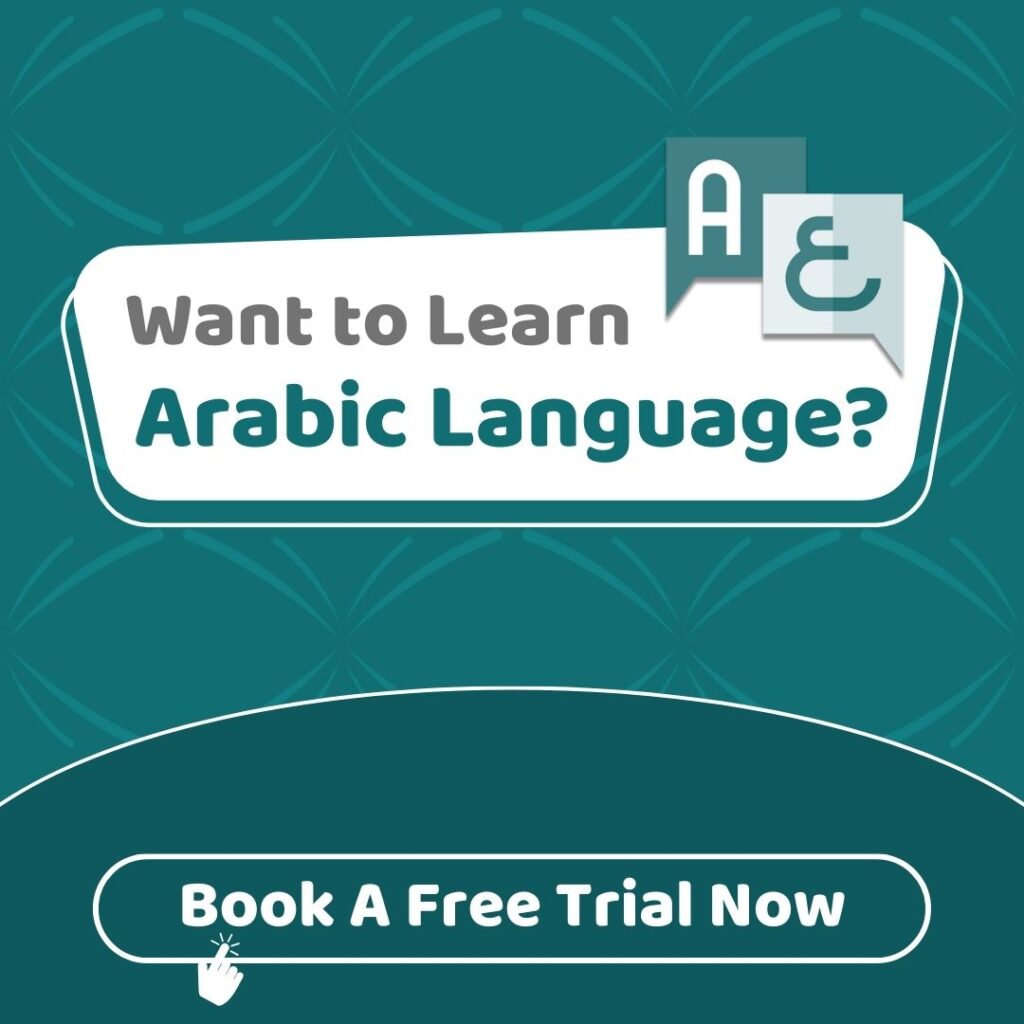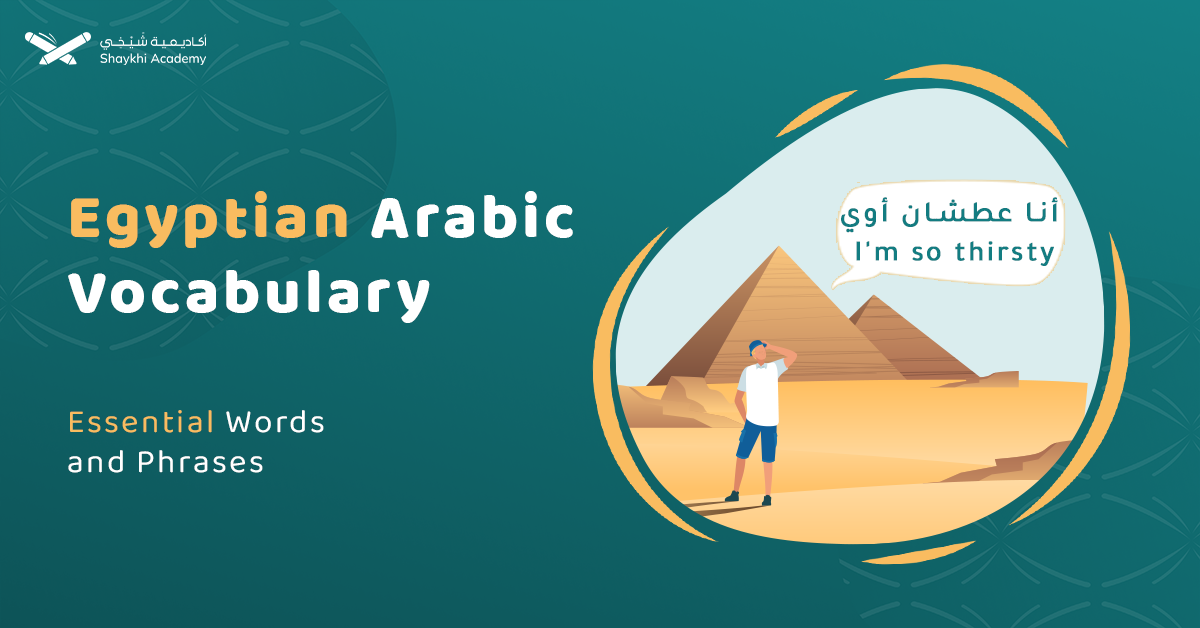Learning Egyptian Arabic can be a rewarding experience for those looking to engage more deeply with the culture and people of Egypt. Egyptian Arabic, a widely spoken dialect in the Arab world, is rich in vocabulary that can help learners navigate daily interactions, whether in casual conversations, marketplaces, or professional settings.
This article explores 50 common Egyptian Arabic words and phrases, providing their meanings, pronunciations, and usage in sentences to help learners build a strong foundation in the language.
From basic greetings like “سلام” (Salām) to everyday necessities like “فلوس” (Flūs) and “أكل” (Akl), this guide is a practical tool for anyone looking to communicate effectively in Egyptian Arabic.
Egyptian Arabic Vocabulary to Learn:
In learning the Egyptian Arabic dialect, it is important to collect Egyptian Arabic vocabulary to learn to boost one’s chances of communicating effectively in Egyptian Arabic.
Although enrolling in a Modern Standard Arabic course will not allow you to focus mainly on the Egyptian Arabic dialect, it can still allow you to experience a side of the language from which many dialects have sprouted out.
This table offers a mix of essential everyday phrases and useful vocabulary for Egyptian Arabic learners:
| # | Egyptian Arabic | Meaning (English) | Pronunciation | Example Sentence |
| 1 | سلام (Salām) | Hello/Peace | sa-laam | سلام عليكم (Salām ʿalaykum) – Peace be upon you. |
| 2 | إزيك (Ezayyak) | How are you? | ezz-ay-yak | إزيك يا أحمد؟ (Ezayyak ya Ahmed?) – How are you, Ahmed? |
| 3 | كويس (Kwayyes) | Good | kway-yess | أنا كويس (Ana kwayyes) – I am good. |
| 4 | نعم (Naʿam) | Yes | naʿam | نعم، فهمت (Naʿam, fahemt) – Yes, I understand. |
| 5 | لا (Lā) | No | laa | لا، مش عاوز (Lā, mesh ʿawiz) – No, I don’t want to. |
| 6 | شكراً (Shokran) | Thank you | shok-ran | شكراً جداً (Shokran gedan) – Thank you very much. |
| 7 | من فضلك (Min faḍlak) | Please | min faḍ-lak | من فضلك ساعدني (Min faḍlak saʿidni) – Please help me. |
| 8 | آسف (Āsef) | Sorry | aa-sef | أنا آسف (Ana āsif) – I am sorry. |
| 9 | ممكن (Momken) | Can/May I? | mom-ken | ممكن أعدي؟ (Momken aʿaddi?) – Can I pass? |
| 10 | دلوقتي (Delwaʾti) | Now | del-waʾ-ti | أنا مشغول دلوقتي (Ana mashghool delwaʾti) – I’m busy now. |
| 11 | بكرة (Bokra) | Tomorrow | bok-ra | هعمل ده بكرة (Haʿmil da bokra) – I’ll do it tomorrow. |
| 12 | إمبارح (Embāriḥ) | Yesterday | em-baa-rih | إمبارح كنت تعبان (Embāriḥ kunt taʿban) – I was tired yesterday. |
| 13 | لو سمحت (Law samaḥt) | Excuse me | law sa-maḥt | لو سمحت، فين المحطة؟ (Law samaḥt, feen el-maḥaṭṭa?) – Excuse me, where is the station? |
| 14 | تمام (Tamām) | Okay/Fine | ta-maam | كل حاجة تمام (Kol ḥaga tamām) – Everything is fine. |
| 15 | فلوس (Flūs) | Money | floos | معنديش فلوس (Maʿandish floos) – I don’t have money. |
| 16 | شغل (Shoghl) | Work | shogh-l | الشغل خلص (El-shoghl khelṣ) – Work is done. |
| 17 | بيت (Bēt) | House | beyt | ده بيتي (Da beyti) – This is my house. |
| 18 | مدرسة (Madrasa) | School | ma-dra-sa | المدرسة بعيدة (El-madrasa baʿīda) – The school is far. |
| 19 | أكل (Akl) | Food | ak-l | الأكل جاهز (El-akl gāhez) – The food is ready. |
| 20 | شاي (Shāy) | Tea | shay | عاوز شاي (ʿawiz shay) – I want tea. |
| 21 | عربية (ʿArabīya) | Car | a-ra-bee-ya | العربية جديدة (El-ʿarabīya gedīda) – The car is new. |
| 22 | مواصلات (Mawāṣalāt) | Transportation | ma-wa-ṣa-laat | المواصلات زحمة (El-mawāṣalāt zaḥma) – The transportation is crowded. |
| 23 | جوعان (Goʿān) | Hungry | go-aan | أنا جوعان (Ana goʿān) – I am hungry. |
| 24 | عطشان (ʿAṭshān) | Thirsty | aṭ-shaan | أنا عطشان (Ana ʿaṭshān) – I am thirsty. |
| 25 | بردان (Bardān) | Cold | bar-daan | الجو برد (El-gaw bard) – The weather is cold. |
| 26 | سخن (Sokhn) | Hot | sokhn | الشاي سخن (El-shay sokhn) – The tea is hot. |
| 27 | طيب (Ṭayyib) | Good/Nice | tay-yib | هو شخص طيب (Howa shakhs ṭayyib) – He is a nice person. |
| 28 | قهوة (ʾahwa) | Coffee | a-hwa | عاوز قهوة (ʿawiz ʾahwa) – I want coffee. |
| 29 | سوق (Sūʾ) | Market | sooʾ | السوق بعيد (El-sūʾ baʿīd) – The market is far. |
| 30 | إيه (Eh) | What? | eh | إيه ده؟ (Eh da?) – What is that? |
| 31 | ليه (Lēh) | Why? | leyh | ليه مش جيت؟ (Lēh mesh geet?) – Why didn’t you come? |
| 32 | مين (Mīn) | Who? | meen | مين ده؟ (Mīn da?) – Who is that? |
| 33 | إمتى (Emta) | When? | em-ta | إمتى هنروح؟ (Emta hanrooh?) – When are we going? |
| 34 | فين (Fēn) | Where? | feen | فين الكتاب؟ (Fēn el-ketāb?) – Where is the book? |
| 35 | إزاي (Ezay) | How? | ez-zay | إزاي عملت كده؟ (Ezay ʿamalt keda?) – How did you do that? |
| 36 | مع السلامة (Maʿa el-salāma) | Goodbye | maʿa el-sa-laa-ma | مع السلامة (Maʿa el-salāma) – Goodbye. |
| 37 | حاضر (Ḥāḍer) | Yes/Sure | ḥa-der | حاضر، هعمل كده (Ḥāḍer, haʿmil keda) – Yes, I’ll do it. |
| 38 | مستشفى (Mustašfa) | Hospital | mus-ta-shfa | المستشفى قريبة (El-mustašfa orayba) – The hospital is near. |
| 39 | مية (Maya) | Water | ma-ya | المية ساقعة (El-maya sāʾʿa) – The water is cold. |
| 40 | ولد (Walad) | Boy | wa-lad | الولد بيلعب (El-walad byelʿab) – The boy is playing. |
| 41 | بنت (Bent) | Girl | bent | البنت ذكية (El-bent zakeya) – The girl is smart. |
| 42 | كتاب (Ketāb) | Book | ke-taab | الكتاب ده جديد (El-ketāb da gedid) – This book is new. |
| 43 | قلم (ʾalam) | Pen | a-lam | ده قلم جديد (Da ʾalam gedid) – This is a new pen. |
| 44 | الساعة كام؟ (El-sāʿa kām?) | What time is it? | el-saa-a kam | الساعة كام دلوقتي؟ (El-sāʿa kām delwaʾti?) – WHat time is it now? |
| 45 | بسرعة (Besoraʿa) | Quickly | be-so-raʿa | تعالى بسرعة (Taʿāla besoraʿa) – Come quickly. |
| 46 | بطيء (Baṭīʾ) | Slow | ba-teeʾ | الإنترنت بطيء (El-internet baṭīʾ) – The internet is slow. |
| 47 | تعبان (Taʿbān) | Tired | taʿ-baan | أنا تعبان جداً (Ana taʿbān gedan) – I am very tired. |
| 48 | زعلان (Zaʿlān) | Sad | zaʿ-lan | هو زعلان عشان كده (Howa zaʿlan ʿashan keda) – He is sad because of that. |
| 49 | مبسوط (Mabṣūt) | Happy | mab-soot | أنا مبسوط النهاردة (Ana mabṣūt el-naharda) – I am happy today. |
| 50 | سهل (Sahl) | Easy | sa-hl | الامتحان سهل (El-emtiḥān sahl) – The exam is easy. |
Many Arabic specialized academies offer general Arabic courses that introduce the different Arabic dialects to learners, in addition to the MSA, which is the official formal Arabic language in many Arab countries.
Read more about Top 60 Msa And Classical Arabic Vocabulary To Learn With Sentence Examples
Unlock the rich and vibrant world of the Arabic language with Shaykhi Academy’s General Arabic course:
Whether you’re planning a visit to Egypt or simply wish to immerse yourself in the Arabic language; one of the richest languages with its various dialects, the general Arabic course at Shaykhi Academy provides you with the tools to communicate confidently in everyday Arabic.
Our qualified teachers will guide you through practical vocabulary, essential phrases, and cultural nuances, helping you master the dialect at your own pace. Don’t miss this opportunity—enroll today and start your journey toward fluency in the Arabic language!
Why Shaykhi Academy?
- Expert Native Tutors: Learn from highly qualified native Arabic speakers.
- Flexible Scheduling: Tailor your classes to fit your busy life.
- Affordable Learning: Access top-quality education at a price that suits you.
- Global Access: Study from anywhere in the world.
Explore Our Arabic Courses:
- Noorani Qaida: Build a strong foundation in Quranic Arabic.
- Comprehensive Arabic Courses: Master the Arabic language, from beginner to advanced levels.
- Fusha Arabic Classes: Delve into Modern Standard Arabic, the key to understanding literature, media, and formal communication across the Arab world.
- Quranic Arabic Course: Enhance your connection with the Quran by learning the language in which it was revealed.
Start Your Arabic Journey Today! Whether you’re just starting or looking to deepen your knowledge, Shaykhi Academy is here to support your journey. Book your free trial now and begin your path to Arabic mastery!

The Conclusion:
Mastering Egyptian Arabic vocabulary is a key step toward achieving fluency in this dynamic dialect. The 50 words and phrases discussed in this article offer a diverse range of expressions that will aid learners in both formal and informal conversations.
By incorporating these terms into daily practice, learners can enhance their understanding of Egyptian culture and strengthen their communication skills. Whether you’re a beginner or looking to refine your language abilities, these essential words will serve as a reliable foundation for interacting confidently in Egyptian Arabic.

















































